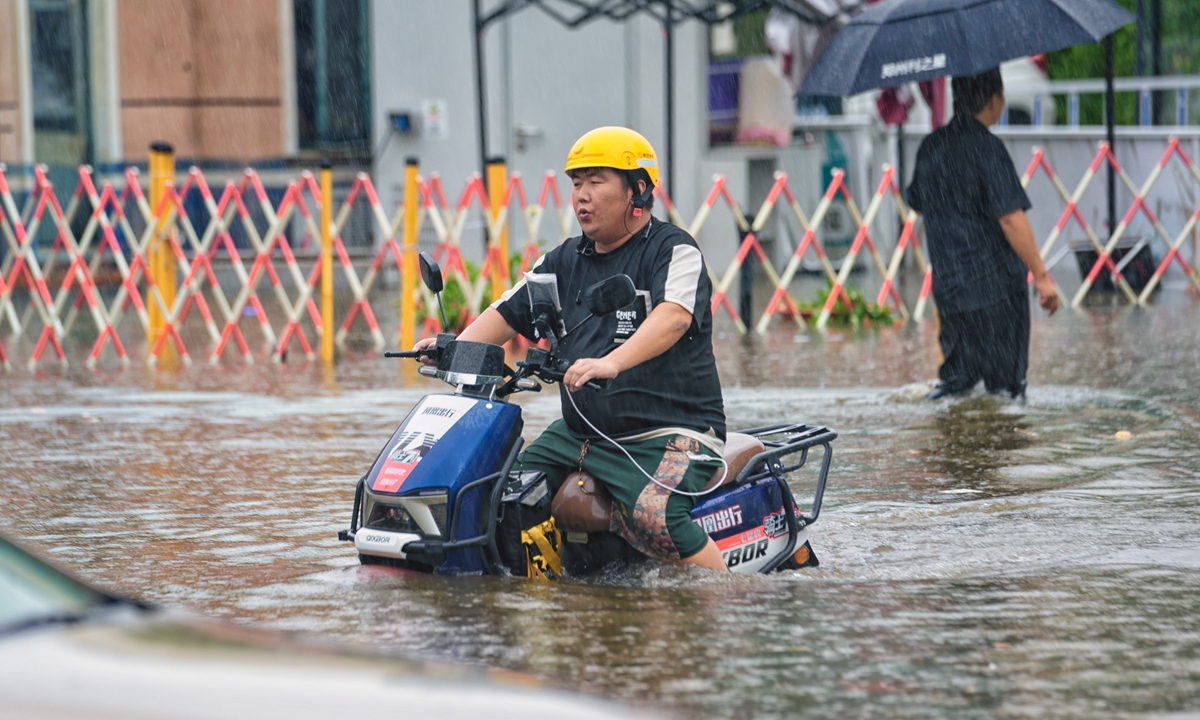
A local resident in Zhengzhou, Central China's Henan Province, struggles to ride through a flooded street on July 8, 2024. The Henan provincial meteorological bureau announced the launch of a Level IV emergency response to a major meteorological disaster (heavy rain). From July 7 to 8, a total of 78 warnings for heavy rain, strong winds, and thunderstorms have been issued across the province. Photo: VCG
China's top meteorological authority has forecast that heavy torrential downpours are anticipated to affect areas in Central China's Henan Province and East China's Shandong Province over the next few days. The authority warned of increasing pressure on flood control systems and reminded the public to be wary of flash floods, geological disasters, river flooding and waterlogging in urban and rural areas that could be triggered by prolonged rainfall during the annual critical flood control period between late July and early August.
China's National Meteorological Center (NMC) continued to issue, on Monday morning, a yellow alert for rainstorms, predicting multiple regions across Northwest China's Shaanxi Province, Southwest China's Sichuan Province, Central China's Henan and Hubei provinces, East China's Anhui, Jiangsu and Shandong provinces, North China's Hebei Province and the Inner Mongolia Autonomous Region and South China's Hainan Province will see heavy rain between Monday morning and Tuesday morning.
According to NMC's forecasts, the eastern part of Henan is anticipated to be hit by torrential rainstorms with precipitation between 250 millimeters and 270 millimeters.
The core zone of rainfall is anticipated to stretch from Henan to Shandong, with the precipitation in the southern part of Shandong anticipated to be extreme.
In Henan, the provincial flood control and drought relief headquarters launched at noon on Monday a Level-IV flood control emergency response in 10 of the province's cities including Zhengzhou, Kaifeng, Shangqiu, Nanyang and Zhumadian.
The torrential downpours in Henan have already affected local residents' daily life and brought great economic losses to them. A resident surnamed Huo from Nanyang in Henan told the Global Times on Monday that his family's farmland had been totally submerged by the raging floodwaters, and there was no hope that they would be able to harvest in this autumn the peanuts they just planted during the summer. They could face a loss of thousands of yuan in income.
Another resident from Dengzhou, Henan, told the Global Times on Monday that it had been raining since Sunday night and that when her family got up to move their car in the middle of the night there was knee-deep water everywhere.
Due to the impact of the torrential rain, 16 rivers in six provincial-level regions - Anhui, Hubei, Jiangsu, Sichuan, Chongqing and Gansu - saw water exceeding warning levels, according to China's Ministry of Water Resources. The ministry on Monday maintained a Level-III flood control emergency response in the Anhui, Jiangxi and Hunan provinces and a Level-IV emergency response in the Jiangsu, Hubei, Sichuan provinces and the Chongqing Municipality.
According to China's Ministry of Water Resources, due to global climate changes and human activities, extreme weather events have become more frequent and more severe in recent years. There has been increasingly evident momentum in the suddenness, extremity, and abnormality of disasters such as heavy rain, floods, and droughts, with flooding and droughts that break records and overturn traditional understanding occurring more frequently, Chinese news outlet The Paper reported on Monday.
According to Yao Wenguang, director of the ministry's department of flood and drought disaster prevention, there are still shortcomings in China's flood and drought disaster prevention and control systems such as insufficient flood control capacity and substandard river dikes in some sections of major rivers. In addition to all this, management of flood storage and detention areas is poor and rain and flood monitoring and forecasting systems need improvement. The ministry has vowed to cope with these shortcomings and risks by assigning designated personnel to assure these shortcomings are fixed.




